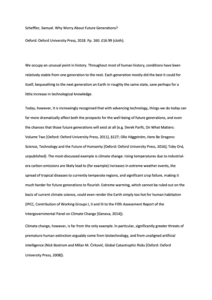Hilary Greaves: Book review of Scheffler's "Why worry about future generations?"
Other papers
The cross-sectional implications of the social discount rate – Maya Eden (Brandeis University)
How should policy discount future returns? The standard approach to this normative question is to ask how much society should care about future generations relative to people alive today. This paper establishes an alternative approach, based on the social desirability of redistributing from the current old to the current young. …
It Only Takes One: The Psychology of Unilateral Decisions – Joshua Lewis (New York University) et al.
Sometimes, one decision can guarantee that a risky event will happen. For instance, it only took one team of researchers to synthesize and publish the horsepox genome, thus imposing its publication even though other researchers might have refrained for biosecurity reasons. We examine cases where everybody who can impose a given event has the same goal but different information about whether the event furthers that goal. …
Is In-kind Kinder than Cash? The Impact of Money vs Food Aid on Social Emotions and Aid Take-up – Samantha Kassirer, Ata Jami, & Maryam Kouchaki (Northwestern University)
There has been widespread endorsement from the academic and philanthropic communities on the new model of giving cash to those in need. Yet the recipient’s perspective has mostly been ignored. The present research explores how food-insecure individuals feel and respond when offered either monetary or food aid from a charity. Our results reveal that individuals are less likely to accept money than food aid from charity because receiving money feels relatively more shameful and relatively less socially positive. Since many…

